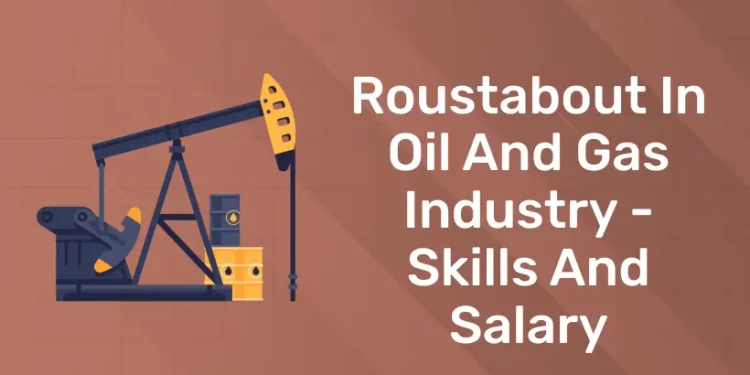Table of Contents
Roustabouts are employed by the oil and gas sectors to carry out a variety of tasks on offshore rigs. Their key responsibilities include maintaining the equipment on oil rigs, helping senior crew members with peripheral chores, and making sure that every drilling operation is completed effectively. It is helpful to be aware of the prerequisites and extra requirements for becoming a roustabout if you are interested in pursuing this line of work. This article looks at the duties of a roustabout, the requirements to become one, and their typical salary.
Introduction
The backbone of the oil and gas sector, roustabouts put in countless hours to make sure drilling rig activities run smoothly. If you’re thinking about becoming a roustabout, you’re going into a demanding but lucrative industry. Because of the diversity of its activities, the oil and gas business provides a wide range of job prospects.
In this industry, anyone can find a position, regardless of experience level, educational background, or degree of education. Even if you only meet the minimum criteria to enter the sector, there is a lot you can learn on the job. Roustabout jobs are only one of the many varied employment options in the oil and gas sector.
Get Certified! Get Confident! Join our Oil and Gas Course!
What is roustabout
1: What is the primary purpose of a refinery in the oil and gas industry?
A roustabout is a manual labourer that works mainly in the drilling areas for oil and gas. They carry out a range of duties, such as equipment inspections, workspace cleaning, and repairs, to guarantee the security and appropriate operation of the machinery and tools on the job site. In addition to offering a distinctive work atmosphere and on-the-job training for career progression, the position frequently involves overseas work.
On the rig, you will encounter everyone from unskilled manual labourers to highly specialised professionals. In a same vein, oil rigs vary from modest, grubby land sites to luxurious, high-tech offshore structures. In addition to having good physical health, you need be psychologically fit to operate in demanding and difficult environments.
What does a Roustabout do?
Basic unskilled and semi-skilled labouring chores, such as labouring and maintenance, are within the purview of routabouts. Roustabouts pick up a number of skills on the job, including how to operate power tools, generators, pumps, and other equipment. For this position, no specialised training is needed. You can apply for this position even if you only have a regular high school diploma.
Roustabout Roles and Responsibilities
Numerous duties for roundabouts can vary every day. The following are the typical duties of this position:
Clean the drill site and vessel
One major duty that most roustabouts fulfil is cleaning the jobsite. Usually, they clean up spills, move big trash, and scrape and paint the job areas. For operations to go smoothly, work spaces must be kept clear of any obstacles or possible hazards.
Examine and fix apparatus
Regular maintenance is typically required for drilling tools and equipment for a number of reasons. For instance, a drilling rig may experience corrosion due to weather-related factors. A roustabout is capable of maintaining and repairing the machinery. As a precaution, they might also check it while extraction is taking place.
Transport and store materials
Machinery can be used by roustabouts, both onshore and offshore, to move and store supplies after deliveries. A drilling site may receive a variety of materials, including machinery, pallets, and pipes, and roustabouts are typically in charge of storing them properly. Moreover, roundabouts might keep track of inventory.
Operate heavy equipment
Operating heavy machinery, such a load-lifter or forklift, may occasionally call for a roustabout. For example, certain deliveries could arrive on bulky pallets. Heavy machine operators may also benefit from the guidance of roustabouts, who could also connect lifting slings to the cargo.
Get Certified! Get Confident! Join our Oil and Gas Course!
Skills needed for roustabout
The following are some typical skills you can make to help you succeed as a roustabout:
Physical strength and stamina
A certain amount of physical strength and endurance are needed for many of the activities that roustabouts perform. These jobs could involve stacking and storing deliveries, loading and unloading goods and moving big debris. Training is an excellent strategy to increase your physical stamina. Your stamina may gradually improve if you make an effort to fit regular exercise into your daily schedule.
Adaptability
Many offshore roustabouts find that in order to thrive in their duties on drilling rigs, they must possess a certain level of mental toughness. It can be frustrating to work remotely, so think about asking for help from your supervisor or coworkers. Having a solid support system at work can enhance your mental health and forge closer relationships with your colleagues.
Attention to detail
Roustabouts are often watchful in carrying out their everyday responsibilities because they are in charge of numerous regions, machines, and chores. It’s common for inspections to call for careful observation, and occasionally you may have to watch over a drilling operation to make sure everyone is safe. For instance, you might need to visually inspect for leaks while walking the flow lines. Being alert can be essential to a drilling operation’s success.
Mechanical ability
Since roustabouts frequently service tools and equipment, many of them have good mechanical skills. They can be skilled in multiple fields to check, maintain, and repair these goods because they are in charge of a range of machinery, tools, and materials. Roustabouts often hone their mechanical skills through on-the-job training, while some may choose to pursue further education through vocational programmes.
Communication
For a roustabout, the workplace may include interacting closely with multiple people. Proficiency in language can be advantageous in fostering a cooperative work atmosphere, organising tasks, and guaranteeing security at the drill site. To improve your linguistic skills and advance in your work, think about studying various communication techniques.
Time management
The activities that roustabouts must complete can vary on a regular basis, thus having time management skills can be helpful. This entails knowing which jobs are essential to the operation’s performance and having the ability to prioritise them throughout your shift. During your shift, try establishing goals for yourself. This might assist you in comprehending the steps you must follow to reach your final objective.
Collaboration
A key component of being a roustabout might be teamwork. At work, you’ll probably collaborate with other roustabouts and drilling personnel. Working together with people around you can help to guarantee everyone’s safety and increase productivity at work.
Safety prioritization
One of the most critical talents for becoming a roustabout is the capacity to prioritize safety. You may safeguard yourself and your team by wearing the appropriate protective gear and adhering strictly to safety protocols. It can be worthwhile to study the particular safety procedures for your place of employment. This can demonstrate to others your commitment to their welfare and help you get ready for the role of roustabout.
Qualification
- Although the majority of roustabouts possess a GED or at least a high school diploma, there are no official educational requirements for them.
- Numerous community colleges and vocational schools have begun to provide programmes that offer rapid roustabout training for people wishing to enter the oil and gas industry as a result of the field’s growth.
- Furthermore, some roustabouts finish an apprenticeship prior to starting a full-time job. This position offers plenty of chances for on-the-job training.
- Physical and mental endurance: In order to perform shifts that can last more than 12 hours for weeks at a time, roustabouts must also possess a high degree of both physical and mental endurance.
- Team coordination: Since roustabouts and roughnecks collaborate on rigs and drill sites, they should be able to efficiently plan and direct the actions of their teammates.
- Communication skills: In order to collaborate with team members, plan activities, and guarantee safety at the drill site, roustabouts must also be proficient verbal communicators.
Best Oil and Gas Course Online
Entri’s Oil and Gas course also provides an opportunity for the students to work on real-time projects from the Middle East, the US and the EU which is an additional perk of joining Entri. The oil and gas course offers job opportunities not only in the mother country but also abroad. Language is no longer going to hinder you from learning. The classes will be taken by professional mentors in Malayalam.
The oil and gas course offers job opportunities not only in the mother country but also abroad. Language is no longer going to hinder you from learning. The classes will be taken by professional mentors in Malayalam.
The curriculum covers the following aspects of Oil and Gas Course:
- Introduction To Oil & Gas
- Rig Introduction
- Bunker Quantity Surveyor Introduction
- Surveyor Procedure
- Sample Procedure
- Handling Disputes
- Oil Cargo Application
Get Certified! Get Confident! Join our Oil and Gas Course!
Average salary
The average yearly income for roustabouts across the country is approximately 5518000 indian rupee. They can also be eligible for overtime pay of Rs. 522750 annually. Many roustabouts also get paid housing on their vessels because the position is offshore. Experience, geography, and area of expertise can all affect a person’s pay.
- In India, the average beginning salary for a routabout is approximately ₹0.3 Lakh ($2,500 per month). Being a Roustabout doesn’t require any prior experience.
- With an average yearly income of ₹ 3.3 Lakhs based on 221 most recent earnings, the range of Roustabout salaries in India for those with less than a year to eight years of experience is ₹ 0.3 Lakhs to ₹ 10.3 Lakhs.
- The maximum annual salary for a Roustabout is ₹10.3 Lakhs, or ₹85.8k per month.
- The average annual salary for an Entry Level Roustabout with less than three years of experience is ₹3.6 Lakhs. The average annual income for a mid-career Roustabout with 4–9 years of experience is ₹4.4 Lakhs, while the average annual compensation for an experienced Roustabout with 10–20 years of experience is ₹4.3 Lakhs.
- The Bureau of Labour Statistics projects that between 2020 and 2030, the number of occupations related to roustabouts would increase by 30%, creating an estimated 12,900 additional jobs over this period.
Career growth
An outstanding chance for professional advancement in the oil and gas sector is to begin as a roustabout.
- Roving labourers can become crane operators, drillers, or rig managers with more training and experience.
- Increased duties, leadership positions, and bigger income possibilities come with career growth.
- Career advancement requires lifelong learning as well as the acquisition of specialised skills through industry certifications.
- When a Roustabout gains experience and meets the requirements, they can advance to become a Roughneck.
- In a few years, once you’ve established yourself as a productive Roughneck, you should anticipate receiving a promotion to Derrick Hand.
- This is directly beneath the Driller. The Roughnecks are under the direction of the Driller.
Conclusion
The oil and gas sector is a dynamic one that depends on a wide range of specialised people to keep things running smoothly. The role of a roustabout is one of the most important ones in helping with drilling and production operations.
Roachabouts are an essential component of the labour force in the oil and gas sector, supporting both drilling and production activities. Those who possess the appropriate abilities, such as mechanical aptitude, teamwork, adaptability, safety awareness, and physical fitness, can succeed in this exciting and fulfilling career. Furthermore, the work of a roustabout presents an appealing entrance point into the oil and gas industry for prospective professionals because to the competitive remuneration and prospects for career progression.









